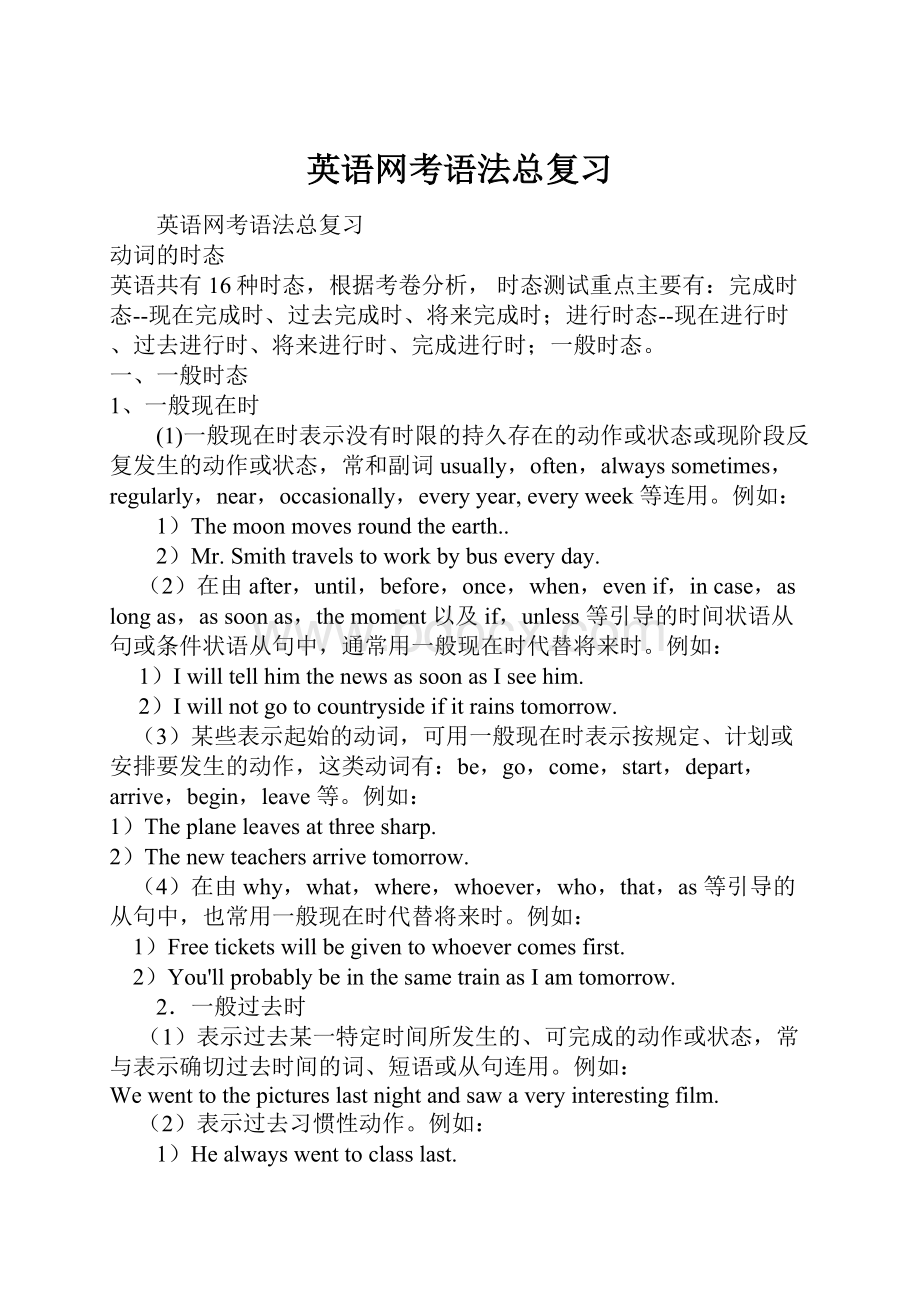英语网考语法总复习.docx
《英语网考语法总复习.docx》由会员分享,可在线阅读,更多相关《英语网考语法总复习.docx(22页珍藏版)》请在冰豆网上搜索。

英语网考语法总复习
英语网考语法总复习
动词的时态
英语共有16种时态,根据考卷分析,时态测试重点主要有:
完成时态--现在完成时、过去完成时、将来完成时;进行时态--现在进行时、过去进行时、将来进行时、完成进行时;一般时态。
一、一般时态
1、一般现在时
(1)一般现在时表示没有时限的持久存在的动作或状态或现阶段反复发生的动作或状态,常和副词usually,often,alwayssometimes,regularly,near,occasionally,everyyear,everyweek等连用。
例如:
1)Themoonmovesroundtheearth..
2)Mr.Smithtravelstoworkbybuseveryday.
(2)在由after,until,before,once,when,evenif,incase,aslongas,assoonas,themoment以及if,unless等引导的时间状语从句或条件状语从句中,通常用一般现在时代替将来时。
例如:
1)IwilltellhimthenewsassoonasIseehim.
2)Iwillnotgotocountrysideifitrainstomorrow.
(3)某些表示起始的动词,可用一般现在时表示按规定、计划或安排要发生的动作,这类动词有:
be,go,come,start,depart,arrive,begin,leave等。
例如:
1)Theplaneleavesatthreesharp.
2)Thenewteachersarrivetomorrow.
(4)在由why,what,where,whoever,who,that,as等引导的从句中,也常用一般现在时代替将来时。
例如:
1)Freeticketswillbegiventowhoevercomesfirst.
2)You'llprobablybeinthesametrainasIamtomorrow.
2.一般过去时
(1)表示过去某一特定时间所发生的、可完成的动作或状态,常与表示确切过去时间的词、短语或从句连用。
例如:
Wewenttothepictureslastnightandsawaveryinterestingfilm.
(2)表示过去习惯性动作。
例如:
1)Healwayswenttoclasslast.
2)Iusedtodomyhomeworkinthelibrary.
(注意与beusedtodoing短语的区别)
3.一般将来时
1)表示将来打算进行或期待发生的动作或状态。
例如:
Ishallgraduatenextyear.
2)几种替代形式:
1)begoingtov在口语中广泛使用,表示准备做或将发生的事情。
例如:
I'mgoingtobuyahousewhenwe'vesavedenoughmoney.
2)betov表示计划安排要做的事,具有"必要"的强制性意义。
例如:
Iamtoplaytennisthisafternoon.
3)beabouttov表示即将发生的事情。
例如:
Hewasabouttostart.
4)beduetov表示预先确定了的事,必定发生的事。
例如:
Thetrainisduetodepartintenminutes.
5)beonthepoint/vergeofv-ing强调即将发生的某种事态。
Thebabywasonthepointofcryingwhenhermotherfinallycamehome.
二、进行时态
1.现在进行时
(1)表示现在正在进行的动作,常与now,rightnow,atthemother,forthetimebeing,forthepresent等连用。
例如:
Don'tdisturbher.Sheisreadinganewspapernow.
(2)表示现阶段经常发生的动作,常与always,continually,forever,constantly等连用。
例如:
Myfatherisforevercriticizingme.
(3)表示根据计划或安排在最近要进行的事情。
具有这种语法功能的动词仅限于过渡性动词。
即表示从一个状态或位置转移到另一个状态或位置上去的动词。
常用的有:
go,come,leave,start,arrive,return等。
例如:
TheyareleavingforHongKongnextmonth.
(4)有些动词不能用进行时,这是一类表示"感觉,感情,存在,从属"等的动词。
如:
see,hear,smell,taste,feel,notice,look,appear,(表示感觉的词);hate,love,fear,like,want,wish,prefer,refuse,forgive(表示感情的动词);be,exist,remain,stay,obtain(表示存在状态的动词);have,possess,own,contain,belong,consistof,form(表示占有与从属的动词);understand,know,believe,think,doubt,forget,remember(表示思考理解的动词)。
但是如果它们词义改变,便也可用进行时态。
例如:
1)Tomlookspale.What'swrongwithhim?
(look在此为联系动词,意为"显得,看上去")
2)Tomislookingforhisbooks.
(look在此为实义动词,意为"寻找")
2.过去进行时
过去进行时表示一个过去的动作发生时或发生后,另一个过去的动作正在进行,或表示过去反复的习惯,常与always,continually,constantly等动词连用。
例如:
1)Wewerediscussingthematterwhentheheadmasterentered.
2)WheneverIvisitedhim,hewasalwayswritingatthedesk.
3.将来进行时
将来进行时主要表示将来某一时刻正在进行的动作,或表示要在将来某一时刻开始,并继续下去的动作。
常用来表示礼貌的询问、请求等。
例如:
1)Thistimenextdaytheywillbesittinginthecinema.
2)Whatwillyoubedoingatsixtomorrowevening?
4.完成进行时
(现在、过去、将来)完成进行时是(现在、过去、将来)完成时的强调形式,将放在完成时态部分讲述。
三、完成时态
完成时态通常表示已完成或从事的动作。
它可分为:
1.现在完成时
(1)现在完成时用来表示对目前状况仍有影响的,刚刚完成的动作(常与yet,already,just连用),或者过去某一时刻发生的,持续到现在的情况(常与for,since连用)。
例如:
1)Ihavejustfinishedmyhomework.
2)Maryhasbeenillforthreedays.
(2)常与现在完成时连用的时间状语有:
since,for,during,over等引导出的短语;副词already,yet,just,ever,now,before,often,lately,recently等;状语词组thisweek(morning,month,year),sofar,uptonow,manytimes,uptothepresent等。
例如:
1)Ihaven'tbeenthereforfiveyears.
2)Sofar,shehasn'tenjoyedthesummervacation.
3)Therehavebeenalotofchangessince1978.
(3)完成时态可用在下列结构中:
This(That,It)is(was)thefirst(second...)time定语从句;This(That,It)is(was)theonly(last)n定语从句;This(That,It)is(was)形容词最高级n定语从句。
如果主句的谓语动词是一般现在时,从句的谓语动词通常用现在完成时;如果主句谓语动词是一般过去时,从句谓语动词通常用过去完成时。
例如:
(1)Thisisoneoftherarestquestionsthathaveeverbeenraisedatsuchameeting.
(2)Therewasaknockatthedoor.Itwasthesecondtimesomeonehadinterruptedmethatevening.
2.过去完成时
(1)表示过去某时间前已经发生的动作或情况,这个过去的时间可以用by,before等介词短语或一个时间状语从句来表示;或者表示一个动作在另一个过去动作之前已经完成。
例如:
1)WehadjusthadourbreakfastwhenTomcamein.
2)Bytheendoflastyeartheyhadturnedout5,000bicycles.
(2)动词expect,hope,mean,intend,plan,suppose,wish,want,desire等用过去完成时,表示过去的希望、预期、意图或愿望等没有实现。
例如:
Ihadmeanttotakeagoodholidaythisyear,butIwasn'tabletogetaway.
另外两种表示"过去想做而未做的事"的表达方式是:
1)was/weretohavedonesth,例如:
Weweretohavecomeyesterday,butwecouldn't.
2)intended(expected,hope,meant,planned,supposed,wished,wanted,desired)tohavedonesth,例如:
Imeanttohavetoldyouaboutit,butIforgottodoso.
(3)过去完成时常用于以下固定句型:
1)hardly,scarcely,barely过去完成时when过去时。
例如:
HardlyhadIgotonthebuswhenitstartedtomove.
2)nosooner过去完成时than过去时。
例如:
NosoonerhadIgoneoutthanhecametoseeme.
3)by(theendof)过去时间,主句中谓语动词用过去完成时。
Theexperimenthadbeenfinishedby4o'clockyesterdayafternoon.
3.将来完成时
将来完成时表示在将来某一时刻将完成或在另一个未来的动作发生之前已经完成的动作;也可以用来表示一种猜测。
常与将来完成时连用的时间状语有:
by(thetime/theendof)表示将来时间的短语和句子;before(theendof)表示将来时间的词语或句子;when,after等加上表示将来动作的句子等。
例如:
1)BythistimetomorrowyouwillhavearrivedinShanghai.
2)Ishallhavefinishedthiscompositionbefore9o'clock.
3)Whenwegetontherailwaystation,thetrainwillprobablyhaveleft.
4.完成进行时
完成进行时是完成时的强调形式,有现在完成进行时,过去完成进行时,将来完成进行时。
(1)现在完成进行时表示过去某一时刻之前开始的动作或状态一直延续到过去某一时刻。
例如:
Ihavebeenlookingformylostbookforthreedays,butIstillhaven'tfoundit.
(2)过去完成进行时表示过去某一时刻之前开始的动作或状态一直延续到过去某一时刻。
例如:
Ithadbeenrainingcatsanddogsforoveraweekandthedownpourhadcausedlandslidesinmanyplaces.
(3)将来完成进行时表示在将来某一时刻之前开始的一个动作或状态一直延续到将来某一时刻。
例如:
Bythetimeyouarrivetonight,shewillhavebeentypingforhours.
英语网考语法总复习
英语倒装句的几种情况
1."某些副词不及物动词主语"的句式,需要全部倒装。
常用的副词主要有:
here,there,now,then,out,in,down,up,away等,表示强调。
主语是代词时,不必倒装。
Outrushedtheboy.
Downcamethebrownwave.
2.表示方位的短语放在句首,后面一般使用倒装语序。
Westofthelakeliesthefamouscity.
3.Therebe主语地点。
其中动词be也可以是其他词,如lie,stand等。
Therearemanydifferentkindsofmooncakesonthetable.
ThereinGreecelivedafamousthinker,namedAristotle.
4.如果直接引语后注明是什么人说的,而且主语是名词时,需要完全倒装;主语是代词时,一般不用倒装。
"Let"sgo!
"saidthecaptain.
"Takeoffyourboots!
"orderedtheguard.
5.为了保持句子平衡,或为了强调表语或状语,或使上下文紧密衔接时。
Theyarrivedatanoldchurch,infrontofwhichstoodabigcrowdofpeople.
6.用于so开头的句子,表示重复前面相同的内容,意为"也怎么样"。
另外,在结果状语从句句型so…that…中,如果强调so…放在句首,主句需要部分倒装。
Ioftengooutforawalkaftersupper.Sodoesshe.
我经常在晚饭后出去散步,她也这样。
Soexcitedwassheatthenewsthatshecouldn"tsayaword.
听到这个消息,她是如此激动,以致于一句话也说不出来。
7.用于nor,neither开头的句子,表示重复前面相同的内容,"也不怎么样"。
LiLeican"tanswerthequestion.NeithercanI.
Ifyoudon"twaitforhim,norshallI.
8.only放在句首,强调状语(副词,介词短语或状语从句等),全句语序要部分倒装。
Onlyinthiswaycanwegetintouchwiththem.
Onlybecausehewasillwasheabsentfromschool.
注意:
only放在句首,强调主语时,语序不必倒装。
OnlyMrWangknowsaboutit.
9.带有否定意义的词放在句首,语序需要部分倒装。
常见的词语有:
not,never,seldom,scarcely,barely,little,atnotime,notonly,notonce,underoncondition,hardly…when,nosooner…than……等。
LittledidIthinkheisaspy.
我一点也没想到他是一个间谍。
HardlyhadIreachedhomewhenitbegantorain.
NosoonerhadIenteredtheroomthanthephonerang.
10.在虚拟语气中,倒装代替条件。
Shouldhebeherenextweek,hewouldhelpuswiththeproblem.
Weretherenolight,wecouldseenothing.
11.用于某些表示祝愿的句子。
Mayyousucceed!
祝你成功!
LongliveFrance!
法兰西万岁!
电大英语网考语法总复习
非谓语动词
非谓语动词指不定式,动名词和分词(现在分词和过去分词)。
他们具有名词和形容词的某些特征,因而可以做主语,表语,宾语,定语和状语。
I动词不定式
作动词的宾语,常用在以下动词后:
afford,agree,ask,attempt,bet,bother,begin,cease,claim,decline,demand,desire,dislike,expect,hasten,hate,hope,learn,decide,seem,intend,try,hesitate,permit,refuse,manage,order,compel,persuade,tend,fail,consent,choose,forget,mean,pledge,pretend,promise,seek,refuse,struggle,threaten,venture,volunteer,wait,wish等。
例如:
Hemanagedtopasstheexam.
Hepersuadedmetoaccepttheinvitation.
Hepromisedtobehereatnine.
Ididn'texpecttoseeyouhere.
在某些复合宾语中,常先用it代表不定式,而把不定式放到后面去。
例如:
Heconsidereditbettertoleavenow.
Ifounditimpossibletofinishtheworkontime.
作定语(常置于名词之后)。
由only,last,next序数词或形容词最高级修饰的名词常用不定式做定语;不定式还可用作名词或代词的的宾语(ability,ambition,anything,attempt,capability,chance,curiosity,desire,decision,determination,effort,failure,intention,need,nothing,opportunity,place,plan,promise,reason,right,something,tendency,time,way,wish)
例如:
Sheisalwaysthefirststudenttoarriveatschool.
Heisalwaysthelastonetoleavetheoffice.
Idon'tthinkheisthebestmantodothejob.
Ihavenodesiretotravel.
You'llfindsomethingtointerestyouhere.
Thereisnoneedtobotherhimwithsuchtrifles.
注:
动词不定式to后所接动词若是不及物动词,而不定式与其修饰的动词之间有动宾关系,这个不定式后就应有必要的介词。
例如:
Ihaven'tdecidedwhichhoteltostayat.
Ifoundnoonetoplaywith.
不定式常用于修饰下列形容词:
able,afraid,angry, anxious,apt,careful,careless,certain,clever,considerate,delighted,difficult, eager,easy,fit,frightened,happy,interesting,likely,lucky,quick,ready,reluctant,right,sorry,surprised,sure,thoughtful,thoughtless,unable,unwilling,wrong etc.
Waterisunfittodrink.
Frenchisdifficulttolearn.
Heisreluctanttoagreewithme.
I'msorrytointerruptyou,butIhaveto.
与疑问词连用。
疑问代词who,what,which和疑问副词when,where,how等后加动词不定式,构成不定式短语,可在句子中作主语、宾语、表语等成分。
例如:
Whentostarthasnotbeendecided.
Theproblemishowto